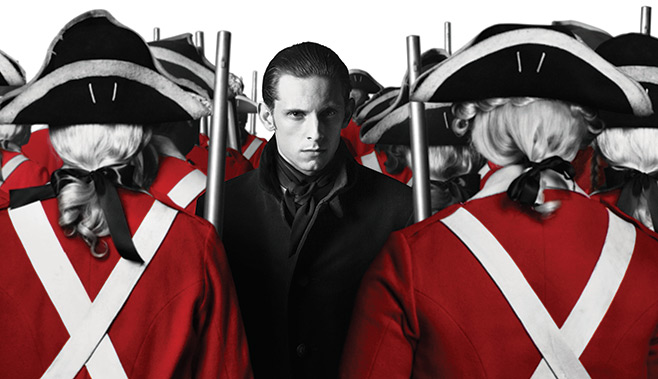AMC has been getting a lot of attention for their original dramas, and their next entry is TURN, the story of America’s fist spy ring. The series is based on the book Washigton’s Spies: The Story of America’s First Spy Ring, written by by Alexander Rose. Rose is now serving as a writer for the series, and he took a few minutes to answer a few questions for DIRECTV viewers before the series premiere on Sunday, April 6 at 9/8c on AMC (Channel 254).
How did you become interested in the Culper Ring, the team of secret agents who helped win the Revolutionary War for the rebels? It really was something of a fortunate accident. I’d been reading a biography of Benedict Arnold as background for a completely different project idea and began to wonder whether there was more to his story than the barebones version we’re usually told. A traitor of the darkest dye I of course knew him to be, but I started to see Arnold as a man of shifting and complex loyalties in the twilight world of espionage. From that moment on, I desperately wanted to know more about the role of spying in the War of Independence. Appetite whetted, I now had my general subject, but which spies should I write about? That’s where the trouble started. If you think about it, it’s actually pretty difficult to write a book about spies because they’re not the type of people who keep fatally incriminating documents lying around. But after a long search I finally found my perfect spies: The Culper Ring, whose long and detailed correspondence with George Washington survives almost intact. It’s a virtually unique treasure trove of documents from any historian’s point of view. Then I worked for about a year to bring their incredible story to life as Washington’s Spies: The Story of America’s First Spy Ring.
You’re an American who was raised in Australia, educated in Britain and lived in Canada before settling in New York. Did those experiences give you a unique perspective on the events and participants of the Revolutionary War?
Though I was born in New York, I do think that growing up outside the U.S. allowed me to approach the War of Independence objectively in the sense that I could avoid the traditional Goodies (Americans) versus Baddies (British) narrative. Put another way, I was very interested in bringing across a variety of perspectives. For instance, Loyalists. These guys, who actually made up a very large proportion of the colonial population, are usually dismissed as losers, creeps, or quasi-traitors—but they weren’t. They too had legitimate ideas and beliefs and convictions, but their side happened to lose. And we all know who history is written by. What was important to me in Washington’s Spies was to illustrate that many, many people in the Colonies had conflicted opinions and tangled loyalties. As in the Civil War—and the Revolution was really something of a civil war—they were torn apart by family tradition, personal beliefs, ambition, religion, fear . . . the list goes on. Everyone had to make the best of a bad situation, make deals with the Devil, and cut a few corners in order to survive. You see this even with the Culper Ring. Some of its members went back and forth on whether they wanted to keep on working, though ultimately they united to serve as Washington’s personal spy ring. What TURN beautifully shows is that these kinds of life-or-death decisions are never easy to make, especially when you’re involved in the shadowy world of spying, where you never know who to trust or who’s watching.
What was the most surprising thing you uncovered while researching your book, Washington’s Spies?
I was most taken aback by seeing just how good George Washington was as a spymaster. I mean, he was a bona fide genius—and genuinely enjoyed spying the daylights out of the British. In an era when intelligence-gathering was both primitive and regarded as superfluous, he was way ahead of his time, a real natural. When Washington was dealing with the “dark arts” of espionage, he was not the stolid, starchy figure we know from the one-dollar bill, but actively involved in running his agents—he called them his “intelligencers”—to make sure they gathered accurate information about the enemy. He was eager to use invisible inks, secret drops, false papers, ciphers, and other innovative tradecraft to get what he wanted. Put together, the Culper Ring and Washington made a formidable team.
What’s it like to watch the events in Washington’s Spies come alive on the screen?
Pretty astounding, in a word. You have to remember, we don’t have any idea of what most of the members of the Culper Ring looked like, so when I was writing the book I composed mental images of them to make them more “real” to me. What is remarkable, I think, is just how closely the actors hew to the pictures I had built of them, not only in how they look but how they think, move, and speak. Quite literally, it’s like watching characters on a page spring to life. Also, when I was writing the book I had to imagine an entire world—the world of Revolutionary New York and Long Island—but when you walk around the amazing sets they’ve constructed it’s as if you’ve traipsed through a time warp and are actually living in the past.
TURN is attracting some amazing actors including Jamie Bell, Stephen Root, and Ian Kahn. Do you think they have what it takes to portray these unique characters and bring their stories to life?
The all-round cast of actors assembled by the executive producers Barry Josephson and Craig Silverstein is amazing. The amount of dedication and thought they bring to the roles has really been surprising. For instance, when we were gearing up to film the pilot, Jamie Bell and I had a long discussion about which books he should read in order to understand his character and what he went through. He went off and bought a big pile of them. Same with Burn Gorman, who plays Major Hewlett, and Angus Macfadyen (Robert Rogers): Both of them became fascinated with the era and its personalities. I think Angus dug up everything that Rogers ever wrote—some really obscure stuff—and integrated it all into his portrayal of this tortured man. With Stephen Root (Nathaniel Sackett) and Ian Kahn (George Washington) I gather they’re equally determined to make their characters stand out. In Washington’s case, I bet you’re going to see something a lot different from what you’re used to seeing.
The British captain who pulled a gun on Abe Woodhull seems like he has the potential to be a breakout villain, like The Walking Dead‘s Governor. Is he based on anybody in particular, or is he an amalgamation of several people?
That British captain is John Simcoe, and he’s played with brilliant menace by Samuel Roukin. Simcoe existed in real life, but as with a couple of other characters in TURN, he’s a bit of a composite for dramatic reasons. But his story is certainly authentic in the context of the time and place. After all, we’re dealing with the secret world here and in that world we don’t know every little thing that happened, which means that there’s lots of room for the writers to come up with the surprise twists and kicky turns that we hope will make the show so riveting for viewers.
TURN premieres Sunday, April 6 at 9/8c on AMC (Channel 254).

